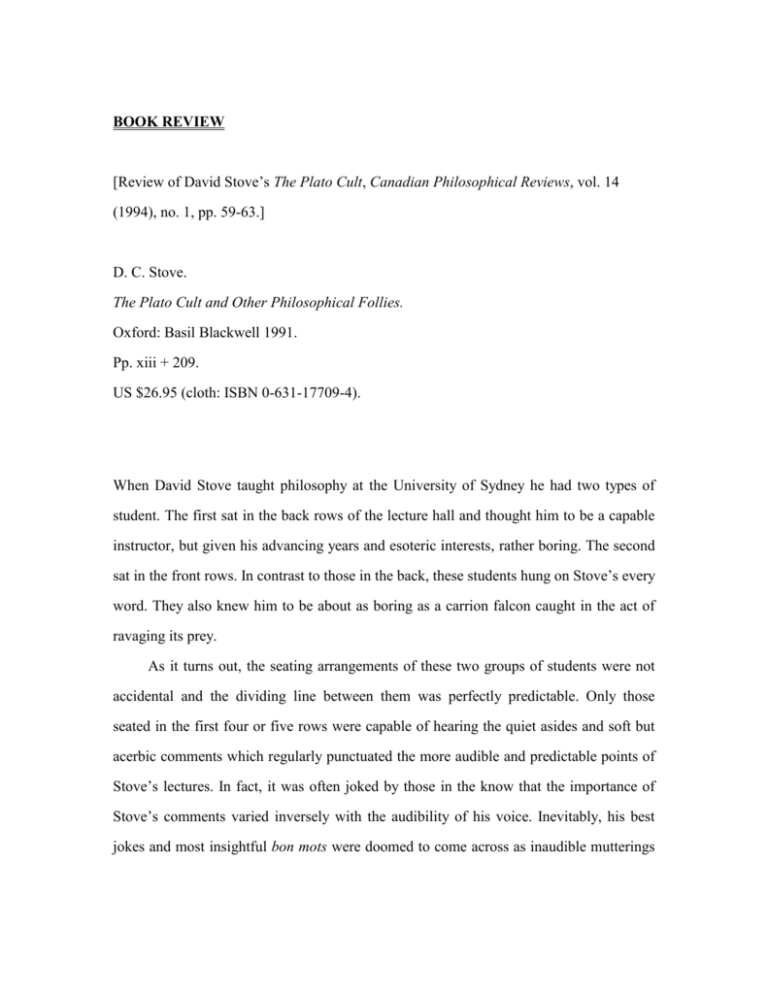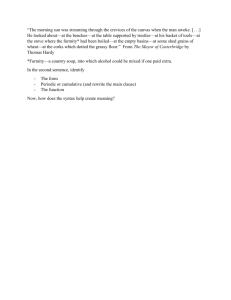Review
advertisement

BOOK REVIEW [Review of David Stove’s The Plato Cult, Canadian Philosophical Reviews, vol. 14 (1994), no. 1, pp. 59-63.] D. C. Stove. The Plato Cult and Other Philosophical Follies. Oxford: Basil Blackwell 1991. Pp. xiii + 209. US $26.95 (cloth: ISBN 0-631-17709-4). When David Stove taught philosophy at the University of Sydney he had two types of student. The first sat in the back rows of the lecture hall and thought him to be a capable instructor, but given his advancing years and esoteric interests, rather boring. The second sat in the front rows. In contrast to those in the back, these students hung on Stove’s every word. They also knew him to be about as boring as a carrion falcon caught in the act of ravaging its prey. As it turns out, the seating arrangements of these two groups of students were not accidental and the dividing line between them was perfectly predictable. Only those seated in the first four or five rows were capable of hearing the quiet asides and soft but acerbic comments which regularly punctuated the more audible and predictable points of Stove’s lectures. In fact, it was often joked by those in the know that the importance of Stove’s comments varied inversely with the audibility of his voice. Inevitably, his best jokes and most insightful bon mots were doomed to come across as inaudible mutterings 2 to the dullards in the back rows concerned more with GPAs and social activism than with philosophy. Luckily for all of us, though, Stove’s latest book captures and records many of his best comments, weaving them together into a caustic critique of what regularly passes for academic philosophy. The Plato Cult has little to do with Plato, other than recognizing him as the primary progenitor of a kind of philosophy which is concerned very little about either the natural world or common sense. Instead, the book concentrates on many of Stove’s favorite contemporary targets—Popper, Lakatos, Kuhn, Feyerabend, Goodman and Nozick—together with several equally deserving historical figures, including Berkeley, Bradley, Kant and Hegel. It is written with ingenuity and style, and with the same sharp wit that readers of Popper and After (1982) have come to expect from Stove. As Stephen Stich tells us on the dust jacket, ‘Stove’s essays are elegant, insightful, beautifully crafted and enormously interesting. They are also outrageous, opinionated, occasionally unfair and almost always side-splittingly funny. … he says things that need to be said, and … he says them with brilliance’. Bad philosophy, Stove reminds us, is easy to catalogue but difficult to characterize. Parmenides claims that there is no motion, even though he traveled, and knew that he traveled, around Greece and southern Italy defending this view. Similarly Plato claims that no particular object ever really has any given property, even though he himself was, and knew that he was, a particular object with given properties. In much the same vein Berkeley claims that there are no mind-independent physical objects, Popper claims that there is no general knowledge, and Feyerabend claims that the correct way to decide upon scientific laws is by means of a democratic vote. Yet, as Stove points out, all these claims 3 are so obviously false that one begins to wonder how it is that such highly regarded thinkers could come to believe them. Stove’s own response is twofold: The first is to conclude that the positivists were basically correct in their abandonment of metaphysics. As Stove puts it, ‘These facts … prove … that there is something fearfully wrong with typical philosophical theories. But this conclusion is Positivism, or at any rate the basic proposition of Positivism’ (xi). The second response is to inquire into what it is that leads to such errors. However, the task of developing a systematic and comprehensive theory of mistaken belief—what Stove calls a nosology of thought—is almost too daunting to consider: ‘The Logical Positivists, to their credit, at least tried to frame a nosology of thought … They acknowledged three ways in which thought can go wrong: contingent falsity, self-contradiction, and meaninglessness. A proposition is meaningless, they said, if it is not a tautology and not verifiable either’ (194). This is perhaps not a bad beginning, but given the range of cognitive error that homo sapiens appears capable of committing, Stove judges the positivist’s catalogue to be ‘pitifully inadequate’ when viewed as a comprehensive inventory of mistaken beliefs (195). Even so, particular cases of mistaken belief can be investigated, and in these cases, just as was the case in explaining the sharply divergent views of Stove’s two groups of students, one begins searching for social or psychological or physical—rather than rational—explanations of such beliefs. Of course, social explanations of why it is that people believe what they do have been much in vogue this century. As Stove himself points out, Marxists especially like to claim that the currency of a scientific or political theory can be explained simply by the historical circumstances and class origins of the theory and its adherents. But they are not 4 the only ones. The current champions of this approach—the sociologists, psychologists and philosophers who are members of the Edinburgh School—believe that all belief can be explained by the social and political interests of the believer. These are the people ‘who have so far succeeded in transcending the cognitive limitations of their own “classsituation” as to be in a position to inform the rest of us that no one can ever transcend the cognitive limitations of his class-situation’ (62). As such, says Stove in a typically biting remark, they are both ‘beneath philosophical notice and unlikely to benefit from it’ (30). The moral is that resorting to a social or psychological or physical explanation is in some cases appropriate, and in some cases not. Typically, rational beliefs are explained ad rem and not ad hominem. In other words, they are accepted or rejected on the basis of evidence, not as a result of historical circumstances. Thus we explain Kepler’s beliefs about the orbits of the planets on the basis of the evidence that he had available to him. We do the same for Newton and Darwin, Mendel and Einstein. Social, political and psychological factors are invoked only when necessary. As Stove points out, ‘You are more likely to need to do so, obviously, the less merit the theory has’ (2). If a slogan is needed, Newton-Smith’s comes to mind: ‘Sociology is only for deviants,’1 and it is philosophical deviants that Stove wishes to discuss. The Plato Cult consists of seven essays, all but the last of which discuss either a well-known philosopher or school of philosophy. The last, Stove says, ‘is about philosophy itself’ (vii), although it might also be fair to characterize it as an apology for positivism and so, for many, it too will be viewed as being about a particular school. Entitled ‘What is Wrong with Our Thoughts? A Neo-Positivist Credo’, this chapter also 1 William Newton-Smith, The Rationality of Science, (Oxford: Routledge & Kegan Paul, 1981), p. 238. 5 indicates something of Stove’s ultimate philosophical pessimism. After all, says Stove, it is unfortunate but true that ‘rational thought—what Hume called the “calm sunshine of the mind”—is historically rare, local, and ephemeral’ (184). Thus, ‘given a large aggregation of human beings, and a long time, you cannot reasonably expect rational thought to win. You could as reasonably expect a thousand unbiased dice, all tossed at once, all to come down “five,” say. There are simply far too many ways, and easy ways, in which human thought can go wrong. Or, put it the other way round: anthropocentrism cannot lose. The jungle will reclaim the clearing …’ (202). Nevertheless, Stove remains defiant: ‘I cannot help feeling that rational thought, “the calm sunshine of the mind”, has a right to exist, as well as madness; and even that it has some right to be heard’ (201). Each of the book’s remaining chapters can be read independently of the others except for the two on British idealism, the second of which follows on from the first. Entitled ‘Idealism: A Victorian Horror-Story’ Parts 1 and 2, these two chapters view idealism as primarily a religious reaction of the nineteenth century against the Enlightenment of the century before. According to a quotation from Quine on the back cover, Stove’s target in these chapters ‘is the predominantly idealistic gobbledygook that dominated European philosophy until about seventy years ago, and his attack is praiseworthy and devastating.’ Of all the essays included in the book, only one has appeared previously, and this one, ‘Cole Porter and Karl Popper: the Jazz Age in the Philosophy of Science,’ certainly deserves reprinting. In this essay, Stove draws a parallel between the influence of the jazz age (summed up in the famous Cole Porter chorus ‘day’s night to-day,’ ‘true is false today,’ ‘the world’s gone mad today’, ‘anything goes’), and that of such contemporary 6 icons in the philosophy of science as Popper (‘not verification but falsification’) and Feyerabend (‘anything goes’). When this essay originally appeared in 1985 in the now sadly defunct British journal, Encounter, the letters to the editor column was still sizzling six months later. Other chapters include essays on Nozick and Goodman, and on solipsism. In ‘“Always apologize, always explain”: Robert Nozick’s War Wounds’, Stove takes Nozick to task for his attempt to substitute explanation for argument in correct philosophical methodology. In response to Nozick’s suggestion (one cannot consistently call it a thesis) that, because it is coercive, “Philosophical argument, trying to get someone to believe something whether he wants to believe it or not, is not … a nice way to behave toward someone,’2 Stove points out the obvious. Philosophical arguments are coercive, but so are geometrical arguments, chemical arguments, and biological arguments. ‘No idea could be more destructive of human life than the ideal of noncoerciveness. A new-born human is so helpless … that it would never survive for one day if hands which are both coercive and loving did not guide it …’ (58). In “Philosophy and Lunacy: Nelson Goodman and the Omnipotence of Words”, Stove similarly devastates Goodman’s remarkable claim, not only that multiple worlds exist, but that through language and other social practices these worlds are of our own making. Stove’s chapter on solipsism, ‘“I only am escaped to tell thee”: Epistemology and the Ishmael Effect’, is by far the most philosophically interesting in The Plato Cult. The reason is that in this chapter Stove gives an argument against the very coherence of the solipsist thesis. In outline the argument is a simple one: The question, ‘Does an external 2 Robert Nozick, Philosophical Explanations, (Cambridge, Mass.: Harvard University Press, 1981), p. 13. 7 world exist?’, is what Stove calls an ‘Ishmael-question.’ An Ishmael-question, in turn, is defined as ‘one which the questioner could not ask unless the answer to it were a certain way … “Did anyone from the Pequod survive?” is an Ishmael-question if it is asked by Ishmael … But there are other questions which would be Ishmael-questions whoever asked them. For example, “Do I know any words?”’ (67). The reason is simply that the very fact that the question is being asked means that it must have a given answer. In the case of solipsism, the claim that ‘An external world exists’ turns out to follow necessarily from ‘At least one human being exists.’ Thus, it also turns out that it is not possible for a human being to ask, ‘even inwardly, whether an external world exists, unless at least one human being exists. And necessarily, if at least one human being exists then an external world exists. Therefore, necessarily, no human being could ask whether an external world exists, unless an external world does exist’ (71). Working through the argument in detail gives the reader a first-hand example of how the verification principle was used by the positivists with such devastating results. Is anything missing from such a vigorous attack on metaphysics? One subject which it would have been enjoyable to see Stove target is, of course, the ontological extravagance of David Lewis. After all, Lewis is famous for claiming that ‘the world we are part of is but one of a plurality of worlds, and that we who inhabit this world are only a few out of all the inhabitants of all the worlds’.3 As is well known, for Lewis, such possible worlds are intended ‘to be respectable entities in their own right. When I profess realism about possible worlds, I mean to be taken literally’.4 3 4 David Lewis, On the Plurality of Worlds, (Oxford: Blackwell, 1986), p. vii. David Lewis, Counterfactuals, (Oxford: Blackwell, 1973), p. 85. 8 Yet what is almost as good as a chapter by Stove is that, on the dust jacket of The Plato Cult, a comment by Lewis himself appears: ‘When philosophers follow where argument leads, too often they are led to doctrines indistinguishable from sheer lunacy— and nobody quite notices! Somehow, the way we write and read philosophy can entice us into taking absurdities seriously. A none-to-gentle shaking does us good. Once it was Moore who did the job. Nowadays it is above all Stove, and he does it with devastating wit. Naked emperors, beware.’ The irony is surely too great to go unnoticed even by Lewis himself. At one time not so long ago, no philosophy undergraduate could complete a degree without having read A.J. Ayer’s Language, Truth and Logic (1936), the book that startled an entire philosophical generation out of its metaphysical complacency and launched logical positivism upon an unsuspecting English-speaking world. Today, in contrast, logical positivism is mentioned in many classrooms only as something of a curiosity, a form of naive science worship that correct-thinking intellectuals have been successful in deconstructing. To this unstudied view of philosophy The Plato Cult is a helpful corrective. For anyone young enough not to have been inspired by the original goals of the positivists, The Plato Cult will introduce and enlighten, as well as entertain. For the rest of us, it will remind us of what we may have forgotten, namely the vigour and clarity of rational thought that is the legacy of positivism. A.D. IRVINE University of British Columbia








